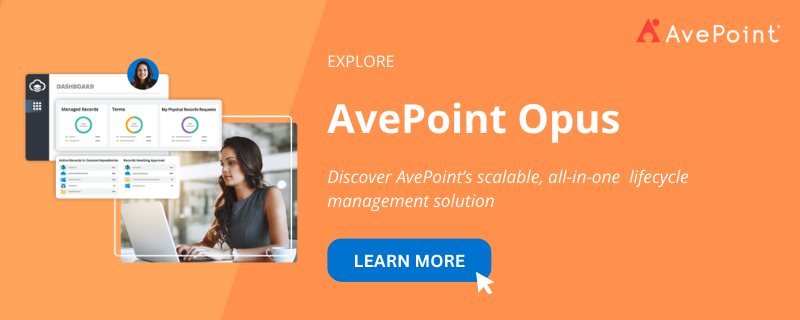We live in the AI era, where the pace of change is accelerating rapidly. Data is being generated at an unprecedented scale, creating both new opportunities and challenges for organizations. Here’s a fun visual for you. It’s estimated that we create 3.5 quintillion bytes of data every 24 hours. If each byte of data was represented by a star, there would be 40X the number of stars than what is currently in the known universe. And that’s being created every day!
Of course, we want to put this huge amount of data to good use with AI tools! However, despite recent research showing that organizations with a more mature strategy are 1.5x more likely to realize the benefits of AI implementation, many still lack foundational measures for effective information management. Today, 44% of organizations do not have lifecycle management solutions and only 29% leverage automation in most aspects of their information management strategy.
This begs the question: are organizations truly ready to tackle the increasing demands of the AI-powered workplace?
The Role of AI and Automation in Information Management
To prepare for AI implementation, 77% of organizations acknowledge the need for new information management measures tailored to the AI era. A win for the information managers who have been saying this for a long time!
Rather than depending solely on manual tagging and archaic rules, AI can power information management solutions to automatically initiate actions like classifying, preserving, or purging data based on evolving policies and business needs. This helps organizations keep pace with the ever-growing volume and complexity of data.
From intelligent storage optimization to automated policy enforcement to contextual data discovery, AI-powered information management solutions allow organizations to take advantage of intelligent, self-learning systems that can streamline and optimize various aspects of the information management lifecycle in preparation for AI implementation.
AvePoint Opus: AI-Powered Information Lifecycle Management Solution
As organizations strive to unlock the transformative potential of AI, they must address two critical factors: bridging the data readiness gap and implementing sustainable processes to scale AI implementation successfully. Achieving true AI readiness goes beyond merely having access to vast data repositories. It requires intelligent systems that can effectively manage, govern, and extract value from data throughout its lifecycle.
This is where AI-powered information management solutions like AvePoint Opus take center stage. Strategically designed to support data readiness requirements, Opus leverages the power of AI and machine learning to revolutionize traditional information management strategies, enabling organizations to scale their AI initiatives seamlessly.
Here are three key reasons why solutions like AvePoint Opus are crucial for unlocking a scalable and sustainable AI implementation:
Intelligent Discovery and Analysis
In the AI-powered workplace, data is the fuel that drives innovation, decision-making, and operational efficiency. Effective data discovery and analysis are critical for organizations to gain comprehensive visibility into their data landscape, enabling them to uncover valuable insights, identify potential risks or opportunities, and make well-informed decisions aligning with their business objectives.
However, the sheer volume and complexity of data generated from multiple sources, including AI systems, can quickly overwhelm traditional data management and analysis methods. Simply relying on manual monitoring and analysis is no longer feasible or practical.
With intelligent discovery and analysis capabilities, AvePoint Opus empowers organizations to unlock the true value of their data assets. Opus goes beyond scanning vast data repositories to look for redundant, obsolete, or trivial (ROT) content. It also enables organizations to deeply understand their data landscape through user patterns, data relationships, and potential areas for optimization or risk mitigation.
Ultimately, this ability to harness intelligent search and discovery capabilities will be a critical competitive differentiator in the AI-powered workplace. Organizations that embrace AI-powered solutions like AvePoint Opus will be equipped to extract maximum value from their data. At the same time, those who rely on outdated manual methods risk falling behind in an increasingly data-driven and AI-centric business landscape.
Streamline Storage Optimization
Managing a vast ocean of data is no easy feat. With the AI and Information Management report revealing that 50% of organizational data is over five years old, organizations likely still keep a significant amount of ROT data.
This ROT data consumes valuable storage space, increases costs, and complicates data management efforts. In the context of AI implementation, the presence of ROT data can have far-reaching implications. AI models and systems thrive on high-quality, relevant, and up-to-date data. Attempting to train AI models or derive insights from data polluted with redundancies and obsolete information can lead to inaccurate results, reduced model performance, and, ultimately, suboptimal AI outcomes.
With intelligent solutions like AvePoint Opus, organizations can free up valuable storage space and reduce costs by automating the archiving or deleting of redundant, obsolete, or trivial data. Furthermore, Opus can uncover hidden factors contributing to storage overages, enabling organizations to plan and implement more efficient storage optimization strategies proactively.
Organizations can effectively curate their data assets by streamlining storage optimization through AI-powered solutions like Opus, creating a foundation of high-quality, relevant, and manageable data primed for AI implementation. This enhances the accuracy and performance of AI models but also mandates more efficient data management processes, enabling organizations to confidently scale their AI initiatives and maximize the return on their AI investments.
Automate Data Classification and Lifecycle Management
According to the same report above, 64% of organizations already manage over 1 petabyte (PB) of data, while 41% have to manage at least 500PB of data. This data deluge is set to intensify further with the rise of AI, as Gartner predicts that 10% of all data generated will come from AI by 2025.
With so much data to manage, simply removing ROT data isn’t enough: scaling your AI implementation means you need constant control over your data assets. Opus simplifies this process by enabling organizations to craft dynamic business rules that automatically or manually control content lifecycles.
From safeguarding archives to strategic destruction, these intelligent systems streamline data management, ensuring seamless regulatory compliance without requiring extensive technical expertise.
Powered by Maestro, AvePoint’s advanced automated classification solution, Opus can intelligently classify and categorize data assets based on their content, context, and relevance to the organization’s specific needs. This intelligent classification enables the system to automatically apply the appropriate retention and disposal policies, ensuring that valuable data is safeguarded. At the same time, obsolete or redundant information is proactively purged, optimizing storage resources and reducing operational costs.
One of the critical strengths of AI-powered data classification solutions is their ability to continuously learn and adapt as an organization’s data landscape evolves. By refining their algorithms and models, these intelligent systems can stay up-to-date and relevant, even as data volumes and complexities increase, providing a future-proof approach to information management.
By automating the data lifecycle management process, organizations can not only gain greater control over their data assets but also significantly reduce the risks associated with non-compliance, data breaches, and inefficient storage utilization. This, in turn, enables organizations to focus their resources on more strategic initiatives, leveraging their data assets to drive innovation, enhance decision-making, and fuel their AI-driven initiatives.
Keeping Pace with AI: Embracing Intelligent Information Management
In the AI era, data is both the fuel and the byproduct – a data generation and consumption cycle that will only grow in the AI-powered workplace. As organizations adopt and scale AI technologies, the volume and complexity of data they must manage will increase exponentially, presenting unprecedented challenges for traditional information management approaches.
The future is AI—and the future of information management is AI. Organizations that embrace AI and automation in their information management strategies will be better equipped to navigate the data deluge, unlock the true value of their information assets, and remain competitive in an increasingly data-driven world.
Ready to accelerate your journey to a sustainable AI adoption? Explore AvePoint Opus today.


